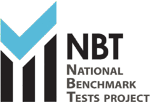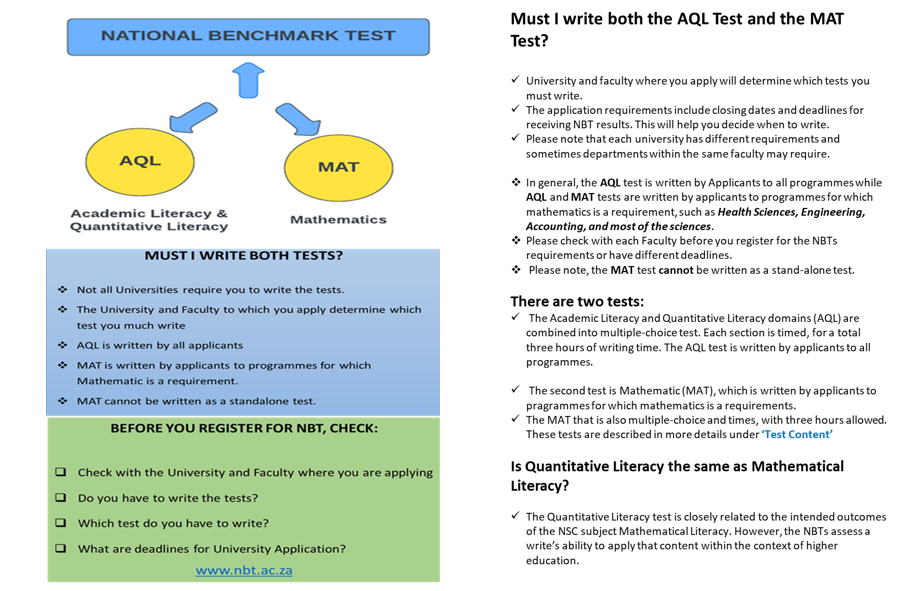FAQ
1. What is the National Benchmark Test?
The National Benchmark Test (NBT) measures your academic readiness for University.
There are two tests. The Academic Literacy and Quantitative Literacy domains (AQL) are
combined into one multiple-choice test. Each section is timed, for a total of three hours of
writing time. The AQL test is written by applicants to all programmes. The second test is Mathematics
(MAT), which is written by applicants to programmes for which mathematics is a requirement.
The MAT test is also multiple-choice and timed, with three hours allowed.
SASL Translation
2. What is the purpose of NBT?
1) To assess entry-level academic and quantitative literacy and mathematics proficiency of students;
2) To assess the relationship between entry level proficiencies and school-level exit outcomes;
3) To provide additional information in the admission and placement of students; and
4) To inform the nature of foundation courses and curriculum responsiveness.
SASL Translation
3. What tests should I write?
4. How do I register for the NBTs?
Registrations are made on the NBT website - www.nbt.ac.za. Click on "book a test" and follow the prompts. At the end of registration you will be given the option to download or print the registration confirmation. Your NBT reference number will be on the statement. Your NBT reference number is your EasyPay reference number against which you make payment.
NB: Please provide your own personal email address upon registration because all communication will be sent to the email provided.
SASL Translation
5. May I change my test date?
Registration for the NBTs is specific to the date and location you select. You are allowed to make changes to your test booking online until the closing date posted on the test schedule. Once bookings close for that test date, you cannot make any changes. If you miss the test for which you are registered, you must book again and pay again to write the NBTs.
SASL Translation
6. May I write the NBTs more than once?
The NBT Project allows an individual to write the NBT twice within a cycle. Note that you must pay the total fee both times. If you write the MAT test a second time, you must also write the AQL test a second time that morning. You must first check with the institutions where you are applying; not all will accept a second score.
SASL Translation
7. What if I have not completed my Grade 12 Curriculum?
Different institutional and faculty requirements determine the deadlines for learners to submit NBT results, which may be as early as June or July.
The time of writing should not be a cause for concern; available data suggests that learners writing the test late in the year have no advantage over those writing in earlier sessions.
However, learners who have not completed the curriculum, or who feel that they may benefit from further revision, may choose to write the tests later in the cycle, but must still meet posted institutional deadlines.
The NBTs are available from May until the first Saturday in January.
SASL Translation
8. Where can I write the NBTs?
The NBTs can be written online or at a physical venue.
Click here to view the schedule and test venues.
There are a number of NBT National writing sessions scheduled on Saturdays, and some Sundays.
The NBT Project reserves the right to cancel a session at short notice. Reasons for cancelling include changes to, low registration as well as structural problems with a venue.
Once registered, you will receive an SMS and an Email two days before your test confirming your test venue.
SASL Translation
9. What if there is no test site near where I live?
The NBT is available to be written online. A goal of the NBT project is to schedule sites around South Africa. If you live in another country or an area where there are no tests nearby, please click here to send us an e-mail. We will assist you to write a "remote" session.nbtremote@uct.ac.za
SASL Translation
10. Remote Writers
A remote writer/student is someone who is unable to write at an institution that generally facilitates the national benchmark test sessions.
Usually it is a writer who is in another country or in an area too remote to be able to make a trip of a reasonable distance to the nearest testing centre.
Procedures
Please note that the test proctor/invigilator should be a person with credibility and not a friend or relative of the writer.
The responsibilities of the test proctor/invigilator are to:
Serve as a receiver for mailed tests and not receive the tests directly from the writer/student;
Maintain test security and confidentiality, and invigilate the test in a quiet environment;
Ensure that the writer does not use any texts, notes or outside help;
Personally mail the original written script(s) to the NBT Project
Not photocopy or reproduce the tests or the student’s answers
The responsibilities of the writer/examinee are to:
Make arrangements for testing with the test proctor/invigilator according to the test due date;
Maintain test security and confidentiality;
Carry out any reasonable and legitimate instructions given by the proctor/invigilator
PLEASE NOTE: The Writer/ Student is responsible for all payments such as proctor/invigilator, courier, venue and test.
When we receive the proctor’s/invigilator’s details we will communicate with him/her directly via the e-mail address provided. It is the writer’s responsibility to stay in touch with the proctor/invigilator.
SASL Translation
11. How do I prepare for the NBTs?
Two booklets are available for teachers to use to assist in preparing you for the tests:
AQL: Preparing your learners
Each of these booklets contain sample questions for you to practice and get a feel for what is in the tests. You may download these individually here:
Download exemplar questions for the Mathematics (MAT) test.
Download exemplar questions for the Academic and Quantitative Literacy (AQL) test.
There are no special study materials for these tests. Keep in mind the usual common sense advice given to students who are about to take a test: Get adequate sleep the night before and avoid having to rush things at the last minute. Do what works best for you.
SASL Translation
12. Should I attend preparation classes?
The NBT Project does not endorse any such courses and questions the value that these purport to offer.
SASL Translation
13. Are past test available?
14. What are the tests like?
There are two tests. The Academic Literacy and Quantitative Literacy domains (AQL) are combined into one multiple-choice test. Each section is timed, for a total of three hours of writing time.
The AQL test is written by applicants to all programmes. The second test is Mathematics (MAT), which is written by applicants to programmes for which mathematics is a requirement.
The MAT test is also multiple-choice and timed, with three hours allowed. These tests are described in more detail under ‘Test Content’.
SASL Translation
15. In what languages are the tests available?
The NBTs are available in English and Afrikaans – the common languages of instruction used at Institutions of Higher Education in South Africa. When registering, you will be asked to indicate the language in which you wish to write.
Note that you can only choose one language; there is no option to write one test in English and the other in Afrikaans.
For students with disabilities, the AL and MATE test has also been translated into Braille.
SASL Translation
16. In what language should I write?
The NBTs are designed to assess readiness for tertiary study in the language of instruction where you plan to attend classes.
The institution to which you apply will have established and posted a language policy or language guidelines on its website. For example, UCT policy states that English is the language of instruction and assessment.
Be aware that some institutions have different language policies at different campuses; certain programmes may even have their own unique language requirements. If you have any question about language requirements, contact the relevant faculty at the institution where you are applying to check the language of instruction before registering for the NBTs.
SASL Translation
17. What if I am applying to two institutions with different language policies?
There are two very general guidelines we can offer. Either chose the language of the programme that is your first choice; or, use English as the default language. However, you are the only one who can make this final decision.
SASL Translation
18. I am a foreign student. May I use an interpreter?
No. The NBTs are designed to assess your abilities and skills in the language of instruction; also, some programmes specifically require the AQL test as an assessment of proficiency in English.
SASL Translation
19. When can/should I write the NBTs?
You should write the NBTs when you feel ready. However, you must also meet the closing dates and deadlines for the institutions where you are applying.
Remember also that you must allow time for your NBTs to be processed, scored and the results sent to institutions.
The dates on which results are available are shown in the test schedule.
Different institutional and faculty requirements determine the deadlines for learners to submit NBT results, which may be as early as June or July.
The time of writing should not be a cause for concern; available data suggests that learners writing the test late in the year have no advantage over those writing in earlier sessions.
However, learners who have not completed the curriculum, or who feel that they may benefit from further revision, may choose to write the tests later in the cycle, but must still meet posted institutional deadlines.
Click here to view the test schedule.
Writers who choose the online NBT should be aware that they may be affected by loadshedding, loss of connectivity or issues with their computer. Writers are therefore advised that they should choose a date earlier in the cycle to allow additional test dates should they experience issues on a test day.
SASL Translation
20. Do I write both tests on the same day?
Yes. The NBT Project does not allow a learner to write the AQL on one day and the MAT on another. If you wish to write a second time, you still must write the AQL in the morning and the MAT in the afternoon.

